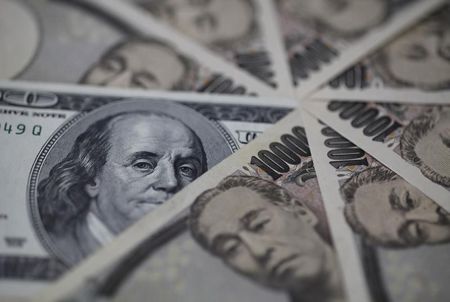By Wayne Cole
SYDNEY (Reuters) - The U.S. dollar powered to seven-year peaks against the yen on Monday and a two-year high on the euro, a punishing trend for commodities priced in dollars as gold, silver and oil all fell.
Disappointing surveys out of China's manufacturing and services sectors highlighted the relative health of the U.S. economy, and piled pressure on other countries to ease monetary policy yet further.
The dollar came within a whisker of 113.00 yen in early trade, before taking a breather at 112.72. It has climbed over 3 percent since the Bank of Japan stunned markets by doubling down on its already massive stimulus programme.
The bold move has raised expectations the European Central Bank will eventually have to bite the bullet on quantitative easing, even if not at its meeting on Thursday.
"In this environment of subdued growth and long-term low-flation, we expect the ECB to announce the purchase of government bonds of euro area member states by early next year at the latest," said Apolline Menut, an analyst at Barclays.
That outlook is one reason the euro caved to a fresh two-year trough of $1.2444, and why the dollar reached levels not seen since mid-2010 against a basket of currencies.
While Tokyo stocks were enjoying a holiday after Friday's 4.8 percent surge in the Nikkei, shares across Asia were consolidating their gains.
MSCI's broadest index of Asia-Pacific shares outside Japan dipped 0.5 percent from a five-week high, but most regional markets were a shade firmer.
In Europe, the FTSE, DAX and CAC 40 were all seen opening with minor changes.
On Wall Street, both the Dow Jones industrial average and the S&P 500 index had notched record closing highs on Friday. The Dow gained 1.13 percent and the S&P 500 1.17 percent.
CHINA DATA UNDERWHELMS
Sentiment in Asia was somewhat tempered by a survey showing China's services sector grew at its slowest pace in nine months in October as a cooling property sector weighed on demand.
That followed an unexpected dip in China's factory activity to a five-month low in October, underlining the uncertain outlook for world's second biggest economy.
Still, the prospect of further policy stimulus helped support stocks and Shanghai gained 0.5 percent.
The soft data knocked almost a full cent off the Australian dollar, which is often used by investors as a liquid proxy for bets on China.
Yet the allure of Australia's relatively high yields has only been burnished by the BOJ's actions and lifted the Aussie to its highest on the yen since May last year.
Indeed, by announcing it would buy more longer-dated bonds and thus push down already threadbare yields, the BOJ is clearly trying to force Japanese investors to seek higher returns in riskier assets, both at home and abroad.
The rush out of yen was given more impetus by news that Japan's $1.2 trillion (751.54 billion pounds) Government Pension Investment Fund will raise its holdings of foreign stocks to 25 percent, well above some analysts' expectations.
In contrast, U.S. Treasury yields ended higher last week after the Federal Reserve wound down its bond buying campaign against a generally improving economic background.
In a data-packed week, the US's ISM index of manufacturing activity due later o Monday is expected to hold at a relatively healthy 56.2 in October. The October payrolls report on Friday is forecast to show a solid increase of around 231,000 new hires.
In commodity markets, gold was pinned near its lowest since 2010 at $1,168 an ounce, as was silver at $15.87.

Brent oil slipped another 23 cents to $85.63 a barrel, while U.S. crude lost 36 cents to $80.18.
(Editing by Eric Meijer)
_800x533_L_1412520412.jpg)